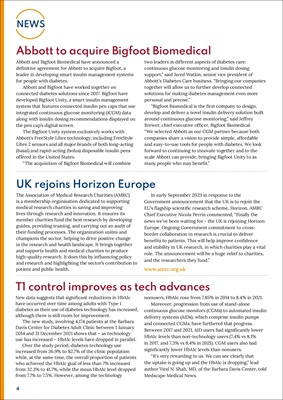
4
NEWS
Abbott to acquire Bigfoot Biomedical
Abbott and Bigfoot Biomedical have announced a
definitive agreement for Abbott to acquire Bigfoot, a
leader in developing smart insulin management systems
for people with diabetes.
Abbott and Bigfoot have worked together on
connected diabetes solutions since 2017. Bigfoot have
developed Bigfoot Unity, a smart insulin management
system that features connected insulin pen caps that use
integrated continuous glucose monitoring (iCGM) data
along with insulin dosing recommendations displayed on
the pen cap's digital screen.
The Bigfoot Unity system exclusively works with
Abbott's FreeStyle Libre technology, including FreeStyle
Libre 2 sensors and all major brands of both long-acting
(basal) and rapid-acting (bolus) disposable insulin pens
offered in the United States.
"The acquisition of Bigfoot Biomedical will combine
two leaders in different aspects of diabetes care:
continuous glucose monitoring and insulin dosing
support," said Jared Watkin, senior vice president of
Abbott's Diabetes Care business. "Bringing our companies
together will allow us to further develop connected
solutions for making diabetes management even more
personal and precise."
"Bigfoot Biomedical is the first company to design,
develop and deliver a novel insulin delivery solution built
around continuous glucose monitoring," said Jeffrey
Brewer, chief executive officer, Bigfoot Biomedical.
"We selected Abbott as our CGM partner because both
companies share a vision to provide simple, affordable
and easy-to-use tools for people with diabetes. We look
forward to continuing to innovate together and to the
scale Abbott can provide, bringing Bigfoot Unity to as
many people who may benefit."
UK rejoins Horizon Europe
The Association of Medical Research Charities (AMRC)
is a membership organisation dedicated to supporting
medical research charities in saving and improving
lives through research and innovation. It ensures its
member charities fund the best research by developing
guides, providing training, and carrying out an audit of
their funding processes. The organization unites and
champions the sector, helping to drive positive change
in the research and health landscape. It brings together
and supports health and medical charities to produce
high-quality research. It does this by influencing policy
and research and highlighting the sector's contribution to
patient and public health.
In early September 2023 in response to the
Government announcement that the UK is to rejoin the
EU's flagship scientific research scheme, Horizon, AMRC
Chief Executive Nicola Perrin commented, "Finally the
news we've been waiting for - the UK is rejoining Horizon
Europe. Ongoing Government commitment to crossborder
collaboration in research is crucial to deliver
benefits to patients. This will help improve confidence
and stability in UK research, in which charities play a vital
role. The announcement will be a huge relief to charities,
and the researchers they fund."
www.amrc.org.uk
T1 control improves as tech advances
New data suggests that significant reductions in HbA1c
have occurred over time among adults with Type 1
diabetes as their use of diabetes technology has increased,
although there is still room for improvement.
The new study, involving 4,174 patients at the Barbara
Davis Center for Diabetes Adult Clinic between 1 January
2014 and 31 December 2021 shows that - as technology
use has increased - HbA1c levels have dropped in parallel.
Over the study period, diabetes technology use
increased from 26.9% to 82.7% of the clinic population
while, at the same time, the overall proportion of patients
who achieved the HbA1c goal of less than 7% increased
from 32.3% to 41.7%, while the mean HbA1c level dropped
from 7.7% to 7.5%. However, among the technology
nonusers, HbA1c rose from 7.85% in 2014 to 8.4% in 2021.
Moreover, progression from use of stand-alone
continuous glucose monitors (CGMs) to automated insulin
delivery systems (AIDs), which comprise insulin pumps
and connected CGMs, have furthered that progress.
Between 2017 and 2021, AID users had significantly lower
HbA1c levels than non-technology users (7.4% vs 8.1%
in 2017, and 7.3% vs 8.4% in 2021). CGM users also had
significantly lower HbA1c levels than nonusers.
"It's very rewarding to us. We can see clearly that
the uptake is going up and the HbA1c is dropping," lead
author Viral N. Shah, MD, of the Barbara Davis Center, told
Medscape Medical News.